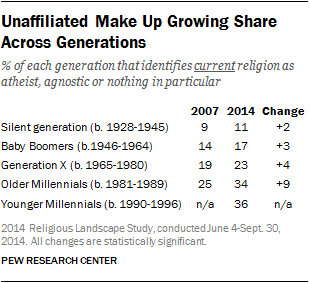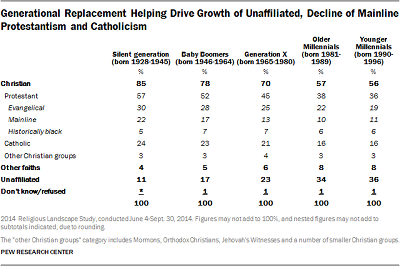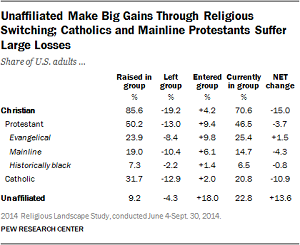Weekly Demographics and Research Polls Report
by Deanna Cantrell
 While attending The Freedom From Religion FoundationÔÇÖs annual convention last month I was privy to a conversation among a group of attendees.┬á They were discussing that the convention was ÔÇ£a sea of white headsÔÇØ and the general consensus was fear that faith may be making a comeback among Millennials.┬á According to a Pew Forum study, their fears are unfounded.┬á Now that is some real, good news.
While attending The Freedom From Religion FoundationÔÇÖs annual convention last month I was privy to a conversation among a group of attendees.┬á They were discussing that the convention was ÔÇ£a sea of white headsÔÇØ and the general consensus was fear that faith may be making a comeback among Millennials.┬á According to a Pew Forum study, their fears are unfounded.┬á Now that is some real, good news.
 As the Millennial generation enters adulthood, its members display much lower levels of religious affiliation, including less connection with Christian churches, than older generations. Fully 36% of young Millennials (those between the ages of 18 and 24) are religiously unaffiliated, as are 34% of older Millennials (ages 25-33). And fewer than six-in-ten Millennials identify with any branch of Christianity, compared with seven-in-ten or more among older generations, including Baby Boomers and Gen-Xers. Just 16% of Millennials are Catholic, and only 11% identify with mainline Protestantism. Roughly one-in-five are evangelical Protestants.
Millennials are not the only demographic giving up the ghost.  About a third of older Millennials (adults currently in their late 20s and early 30s) now say they have no religion, up nine percentage points among this cohort since 2007, when the same group was between ages 18 and 26. Nearly a quarter of Generation Xers now say they have no particular religion or describe themselves as atheists or agnostics, up four points in seven years. Baby Boomers also have become slightly but noticeably more likely to identify as nonreligious recent years.
Here is a promising fact: nearly one-in-five U.S. adults (18%) were raised in a religious faith and now identify with  no religion.  As access to higher education and information increases are more Americans beginning to question what they were spoon fed during their upbringing?  According to Pew, more than 85% of Americans were raised Christian but nearly a quarter of those have left the ideology.
no religion.  As access to higher education and information increases are more Americans beginning to question what they were spoon fed during their upbringing?  According to Pew, more than 85% of Americans were raised Christian but nearly a quarter of those have left the ideology.
This begs the question, with more and more Americans turning their back on religion, why is the presidential race so steeped in religious debate?  Unaffiliated individuals are nearly 10 percent less likely to be politically engaged, and in exit polls during the 2012 election only 12 percent of people claimed no religious affiliation. At no point in the foreseeable future will religion become politically obsolescent: Saying you are an atheist on CNN would be political suicide for a candidate from either party. This year, Hillary Clinton even stated that the Bible is her favorite book, and she comes from the less religious party.
 Candidates, especially the anti-establishment types in the Republican primary, have bemoaned the prevalence of special interests in politics. By definition, an interest group is a vocal minority or majority that wields an undue┬áamount of influence on the political process through sheer interest and engagement. If current trends continue, it’s conceivable that the label “special interest” could┬áapply┬áto those who vote based on religion.
Candidates, especially the anti-establishment types in the Republican primary, have bemoaned the prevalence of special interests in politics. By definition, an interest group is a vocal minority or majority that wields an undue┬áamount of influence on the political process through sheer interest and engagement. If current trends continue, it’s conceivable that the label “special interest” could┬áapply┬áto those who vote based on religion.
Is this pandering?┬á Perhaps the solution to this problem is to reach out to these unaffiliated who are not voting.┬á ItÔÇÖs time to chase the religious right out of politics. ┬áWith this shift in the country’s religious landscape, when will politics catch on?
